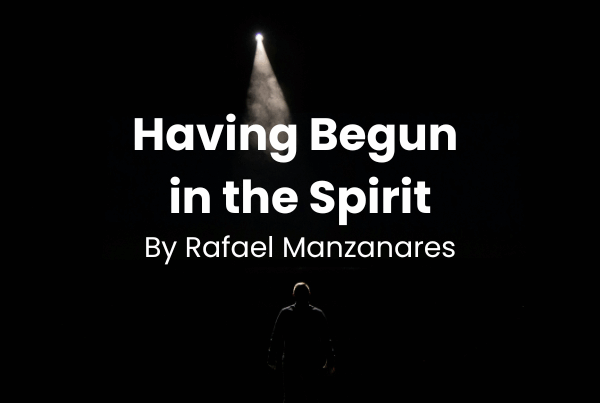
Maintaining good relationships is a priority for us in ministry. Our vocation is peculiar in that we work with people, and that gets messy. Like social media, there was a time of innocence when I’d connect with friends I hadn’t seen in a long time, perhaps share a quote or a special moment with my family. Indeed, they were created with this goal in mind, but too often, a casual remark or snarky observation exploded into a conversation that most people wouldn’t have in person.
Time has passed, and I don’t know if it’s getting better. I’m pretty sure we can’t blame Covid or politics anymore, but perhaps a simpler explanation that Jesus brings up in the Sermon on the Mount fits the bill. It occurred to me that this is more of a heart matter. Social media is only a symptom that covers the banality of a more sinister evil. The kind of heart problem that sees another in a way that isn’t right. Although Jesus uses the word “murder,” and it troubles me to write this, I’d like to look into its root, anger, which leads us to see our need for heart reform.
The Law …
Knowing our Calvary Chapel readership, I feel safe in our general knowledge of the Law of Moses, especially of the Ten Commandments. When it comes to “you shall not murder,” I think we have some great expositors among us who could bring this universal law to us in an impactful message that I’d remember for years. Murder is evil. Death, whether caused by an accident or illness, is always a tragedy. I love what C.S. Lewis wrote in A Grief Observed: “The death of a loved one is an amputation.” I think that’s also true of friends and church members. Looking out to the empty chair that was once filled with the thoughts, dreams, and human struggles that we knew. The bad moods and the warm welcome are no longer there for this life.
Jesus’ word in Matthew 5:21, “You have heard that it was said to those of old, ‘You shall not murder,’ and, ‘whoever murders will be liable to judgment,’” means more than “to kill”: it’s a criminal death—it’s murder. We can sweep aside the easy reference to “man-slaughter.” The idea is so repulsive that we sometimes hear people who want to justify themselves: “At least I’m not a murderer …” That would necessitate action and judgment.
We know that all this gives insight into the value of human life in the eyes of God. He loves people; He loves His people. In the exegetical context of the first Israelites to hear the “Ten Words,” there’s an emphasis on the value of life that will be very important for these people freed from an inhuman existence in Egypt. Slavery was a life of slow murder, one brick at a time. Moses’ law gives rights to women, to the servants, and the poor. Israel was called to higher ethics than other nations because it was a holy people to God, to be a testimony to Him.
Jesus Dives Deeper
As we know Him, we expect Jesus to go further than what the Law of Moses, the “Oral Law,” the Mishnah, or tradition interpreted the sixth commandment. Jesus fulfills the law and shows better justice in 5:22: “But I say to you that anyone who is angry with his brother will be liable to judgment; and whoever says to his brother, ‘Raka,’ will be liable to the council; and whoever says, ‘You fool!’ will be liable to the hell of fire.” As I reread this, even while typing this sentence, it shocks me to see anger equated with murder. What about non-premeditated emotional outbursts due to fatigue, lack of self-care, or spiritual attack? And yet, wasn’t Jesus angry? Doesn’t Revelation speak about the “wrath of God”? Those last questions may allow us to peer behind the curtain of what lurks in the somber corners of our heart.
Everything starts long before we take action. What Jesus said goes back to Genesis 4:5-8, the familiar story of fratricide. Cain was angry. He was angry with his brother, angry with God, and despite God’s reasoning and instructing him, he murdered Abel. The pattern that Jesus shows in Matthew is a striking parallel. Cain was “very angry” (4:5), spoke to his brother, and killed him (4:8). As anyone who has brothers and sisters knows, when one sibling is “very angry” and wants to talk to the offending party, the conversation is less than cordial. I think we get a clue to this conversation in the Septuagint, which adds a telling phrase, “Let’s go to the field …”[1]
I believe that’s why Jesus puts His finger on anger. Still, the way He speaks of anger is interesting: It’s generally used for the wrath of God. According to Hermann Kleinknecht, when used for humans, there’s a strong nuance for punishment or revenge.[2] This says to me that what Jesus condemns is a deep anger that seeks to act in the place of God. Only God can punish or “equalize” the score. The insults that we use are weapons of intent. Though we may never do it, that little word said under our breath or in the secret of our car reveals in our heart that we’ve dehumanized the offender. This may be why it’s so hard to apologize afterward; we stopped seeing them as equals.
This reminds me of the mechanics of anger and the evil of contempt brilliantly developed by Dallas Willard.[3] Anger is an emotional reaction to my will being violated, to fear of a threat against my person, or to the violation of my rights. Much more can be said, but in a basic way, anger is natural in a fallen world. With so many free wills running into each other like bumper cars at a carnival, we know it’s there even when we don’t want to admit it. When we learn that someone is angry with us, we feel hurt. It’s perfectly natural because we’ve been countered by the will or emotions of someone else, which now makes us rethink our trajectory. This reminds me of Paul’s warning in Ephesians 4:26-27: “If you get angry, do not sin; do not allow the sun to go down on your anger and do not give an opportunity to the devil” (MOUNCE).
We can’t continue doing or saying what we once did in the same way. There’s been a collision of wills. What we do with it after determines everything—for Cain, he fed his anger. But if we feed our anger, it becomes what Jesus describes. A well-fed anger seeks retribution and is ready to ensure it. This produces insults, bitterness, and hatred. In our heart, we’d like to erase the person, or make them pay … in the place of God. This anger becomes the contempt that, at the base, no longer sees the humanity of the person, the image of God, and says: You fool.
What Then?
What do we do then, knowing that this anger is part of fallen nature? Jesus’ practical examples in 5:23-24 show us how to behave before God, while 5:25-26 give hearty instruction on how to seek resolution with others. Rather than develop these, I’d like to turn back to the heart reform I wrote about earlier. There’s no reforming our own heart. I’m not suggesting a diet of do’s and don’ts, and I’m especially not inciting us to throw stones at our glass houses.
When we look at the ugliness of anger and contempt, whether it’s taken aim at you or has exploded from your own heart, we find help returning to the beauty of Christ. Jesus, when we were enemies, when we trivialised Him as a good teacher or prophet and wholeheartedly embraced contempt for those for whom He died, took our offenses on His account. Before we asked Him for forgiveness, He stepped into our evil and bore the full penalty. He forgave so that we can, too. When we act in this way, we show ourselves poor in spirit because we rely on the riches of Christ to forgive and ask for forgiveness. We show ourselves as citizens of the Kingdom. I know full well the impossibility of what I’m writing unless the heart is reformed. My mind flows back to all the times I’ve fallen short, and that’s why I can’t write as if I’ve now learned the new secret of success. I find the old one much more effective, running back to the arms of the Savior.
References
[1] Διέλθωμεν εἰς τὸ πεδίον / Dielthōmen eis to pedion.
[2] Kleinknect, Hermann. Theological Dictionary of the New Testament, TDNT (LITTLE KITTEL). William B. Eerdmans Publishing Company, 1985, s.v. Article on: “ὀργή ὀργίζομαι ὀργίλος παροργίζω παροργισμός,” p 716.
[3] Most of what I write in this paragraph is paraphrased or interpreted from:
Willard, Dallas. The Divine Conspiracy. Harper Collins Publishers. Dublin. 1998. pp. 164-177.







